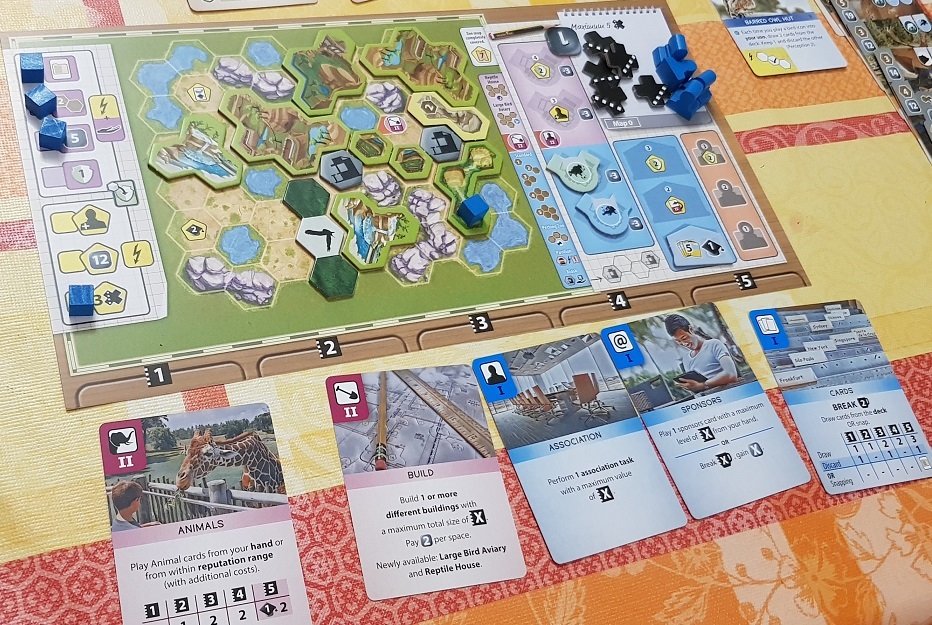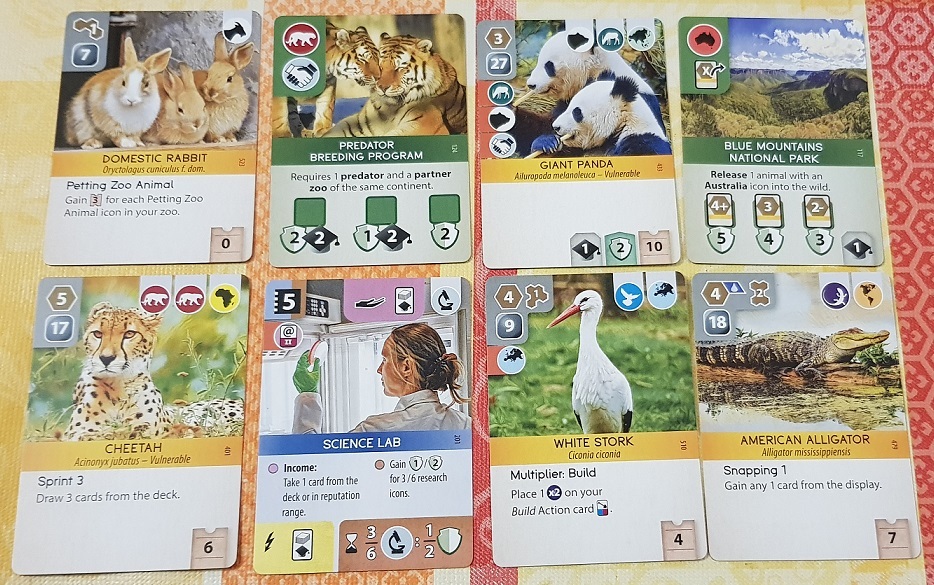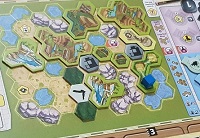Since its publication in 2021, Ark Nova has taken the board gaming world by storm. Everyone was either playing it, wanting to play it, or talking about it. Granted, a lot of the commotion around the game was hyped, but that doesn’t mean the game didn’t deserve it.
It is, after all, an exceptional board game. Let’s take a look at 5 reasons I believe made Ark Nova ride the popularity train so hard.
5 Reasons Why Ark Nova is so Popular
The main reasons Ark Nova is such a popular board game are the appealing theme, intuitive, easy-to-learn game mechanics, and rewarding, non-confrontational gameplay. Additionally, the large deck of diverse cards greatly helps with the replay value.
1. Theme
While animals are a common feature in board games, a good fully-fledged zoo-themed board game hadn’t existed prior to Ark Nova. Yes, there have been a few lighter games, but nothing at the level of tycoon games that we were used to from video gaming.
There is just some indescribable appeal behind planning your zoo, observing it grow, and filling it with exotic animals. Of course, it helps if the animals are pictured with very pretty images and the game sports an overall great table presence. Ark Nova fulfills all those requirements.

2. Intuitive Game Mechanics
While Ark Nova is by no means a light game, the ruleset is very concise and easy to understand. It all starts with the basic five actions and the action selection that promotes unused actions by making them stronger. All the actions can be distilled down to basics and everything you need to know is pretty much written on the action card.
Yes, the animal cards have a lot of icons on them, but you don’t need to remember any of them. They all come into play naturally at their appropriate time.
And the whole concept of the zoo is highly intuitive and strongly connects the theme with the rules. Even kids will understand the basic principles:
- You’re running a zoo, therefore you need to accommodate animals in it. The more prestigious the animal, the more appeal points you get if you have it in your zoo.
- In order to place an animal, it needs a place to stay (a pen). According to an animal, some of those pens will need to have access to water or rocks. Often, animals will also have other prerequisites, clearly depicted on their card.
- To score big conservation points, you need to have a certain set of animals or do something special, such as release an animal back into the wilderness.
Other than explaining the 5 basic actions, this is pretty much everything you need to teach new players before the first play. Everything else will reveal itself naturally during the game.
These easy-to-teach mechanics make Ark Nova accessible to a wide range of players, while also allowing for clever play and forming of powerful combos. Therefore, Ark Nova has an exceptional rules-to-gameplay-depth ratio.
3. Rewarding Gameplay
Ark Nova’s gameplay loop is about action selection which gives players constant rewards.
Build a pen -> fulfill requirements for animal placement -> place animals -> complete conservation projects.
Every step of this action chain offers rewards to players. There are pen placement bonuses on the map, bonuses for university and zoo friendships (action card upgrades, new workers), animal placement offers appeal points and special abilities, and conservation projects award you with precious green points. This process, emphasized by the clever action selection mechanics creates a highly addictive gameplay, where you’re fully focused and immersed in getting your next big animal in.
Occasional bigger rewards (combos that you unlock by triggering several things at once) provide an even higher satisfaction rush. With careful planning, Ark Nova offers a high ceiling for synergies. It’s not insanely high so you would lose track of all the actions and things you unlock (i.e. Praga Caput Regni), but it just the right amount of free stuff vs complexity.
4. It’s Not Focused on Winning
Going hand in hand with the previous point is the non-confrontational design of the game. Ark Nova is not focused on winning and you can prolong the end game for as long as you’re comfortable, particularly among casual players. Of course, you can play the game cutthroat-competitively, but the thick deck and the random card draw discourage this and the game loses a lot of its appeal if you do that.
Since the game is not limited by a turn or round number, this means the number of actions and resources is not finite. Therefore you are not constantly under pressure and tight in resources (i.e. Woodcraft), which can be very frustrating to endure. Of course, optimizing your turns and action sequences (min/maxing) is still awarded by the game and the player who does it better will have the upper hand.
Other than a few animal abilities (which are optional and we normally play without using them), Ark Nova is unconfrontational. Players’ zoos coexist without trying to actively harm each other. Thus, players don’t experience the disappointment of having something taken away from them, either by their bad play or by the good play of another player. Ark Nova only rewards, it does not punish.

5. Card Diversity
While the sheer number of cards discourages competitive play, it does encourage exploration, repeated plays, and trying out different things. This goes hand-in-hand with promoting casual play, as mentioned above.
The number of animal cards that come up during one game is only a part of the whole deck and this gives each playthrough a different flavor. Similar could be said about conservation projects and sponsor cards. A lot of diversity all around makes Ark Nova highly replayable.
Conclusion
Ark Nova is a great game. While the long playing time and the huge footprint do hurt it a bit, the intuitive rules and the addictingly rewarding tactical gameplay vastly outweigh them.
It’s probably not a coincidence that the tactical gameplay has a lot in common with Wingspan, another highly popular board game. If we stretch it a bit, Ark Nova could even be deemed as a heavier Wingspan. I you like one, you’ll definitely like the other.
Do you like what you just read? Consider subscribing:
